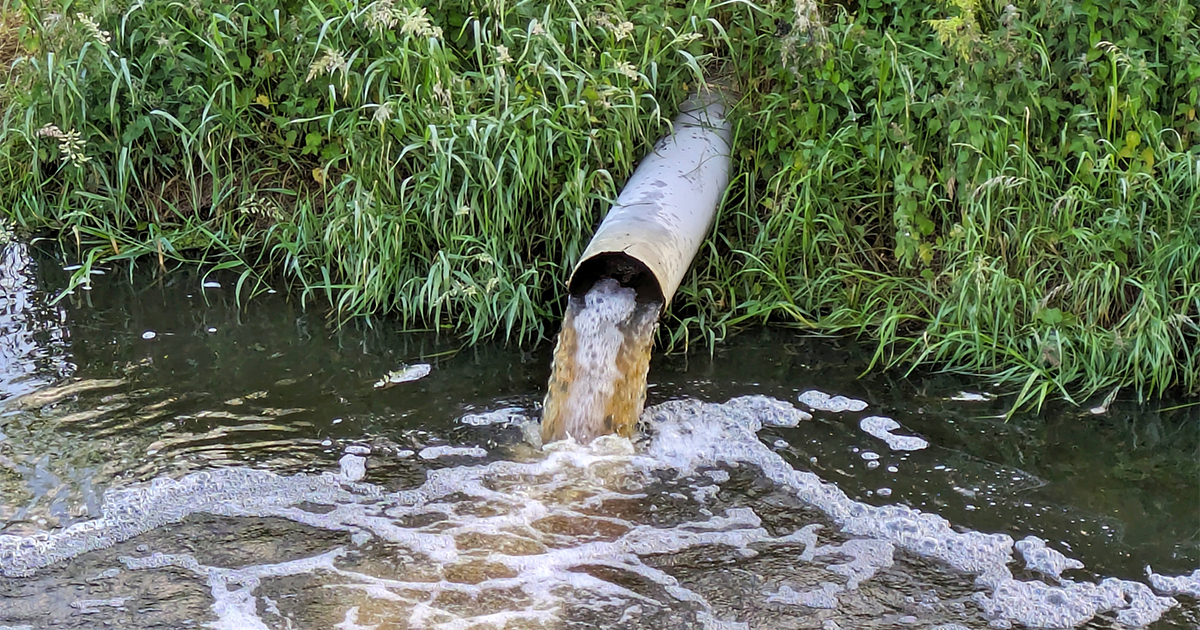Environmentally Friendly Composite Materials
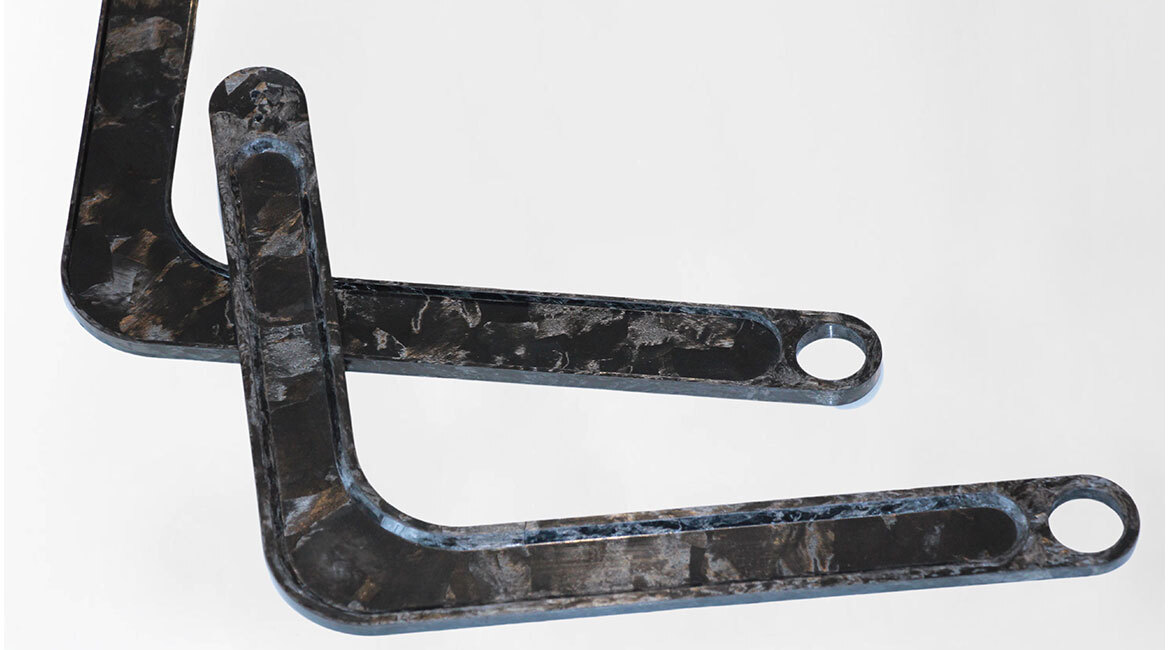
Parts made by Francis Léveillé. CC Licence.
Composite materials are increasingly being used in many industries because of their mechanical strength and low weight. They are used in the automotive, aeronautics, and energy sectors, among others. From wind turbines to aircraft structures, the demand for composite materials has increased in recent years, despite the fact that there are still no true solutions for the disposal of end-of-life structures. Researchers at the Marcelle-Gauvreau Research Chair in Environmentally Friendly Composite Materials plan to remedy this situation in several ways.
Promoting the Use of Thermoplastics
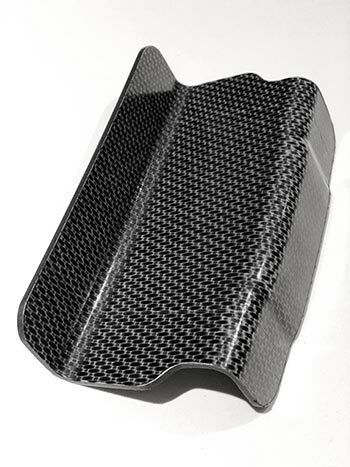
Aircraft fuselage clip made by stamp forming carbon fibre/polyphenylene sulphide thermoplastic composites
Both aircraft and wind turbines are made primarily from thermoset composites. These materials are very difficult to recycle. In their end-of-life cycle, they are either buried or simply left to accumulate in landfills. The work of this branch of the Chair, in continuity with the research of Chairholder Martine Dubé, will be to promote the use of thermoplastics in aeronautics, a type of polymer more easily recyclable than thermosets. To this end, efficient and economical manufacturing processes will be developed to render the use of thermoplastics more attractive.
The researchers will also tackle the reparability of structures. Indeed, although small aircraft parts can be easily replaced in case of breakage, such is not the case for large structures like the fuselage. Currently, no repair process for thermoplastic composites has been approved by the aerospace industry, which hinders the transition to this type of polymer. The preferred process will be induction welding, a technology in which heat is induced electromagnetically in the workpiece.
Reusing Production Waste
Producing thermoplastic composite parts inevitably generates production waste like offcuts. The second branch of the Chair will focus on reusing the waste by finding new applications. The economic aspect will be the focus of this branch in promoting solutions for industry, taking into account the available volumes.
The first option is to reduce cuttings of the whole material (fibre and polymer) into flakes in order to obtain fibres of uniform length. As the fibre is no longer continuous, parts produced from this recycled material will be less efficient and would not be suitable for highly structural applications in the aeronautics industry. On the other hand, they would most likely meet the requirements of a less demanding industry like the automotive industry, or even of aircraft interior components that are not subject to significant mechanical loads. One of the forming processes studied by this branch is stamp forming, as it allows for high production rates, an essential component in manufacturing large volumes of parts. Depending on compatibility, materials in lower volumes could be combined with others.
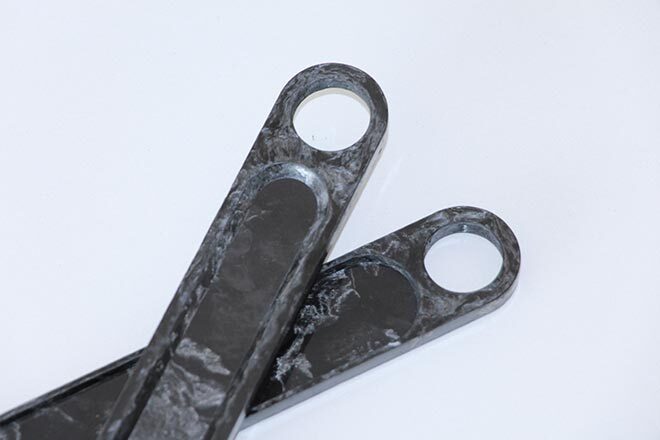
Aircraft interior parts made from prepreg thermoplastic composite flakes produced by compression moulding. Parts made by Master’s student Francis Léveillé of ÉTS. Similar flakes, but from thermoplastic composite scraps, will be used in the Chair’s work.
Another option is the production of hybrid materials, created from mixing recycled flakes with a virgin material with a continuous fibre. Finally, the third option to be studied is the grinding of the flakes into a powder that will be added to other virgin polymers to provide some mechanical reinforcement, then shaped by additive manufacturing.
Recycling End-of-Life Structures
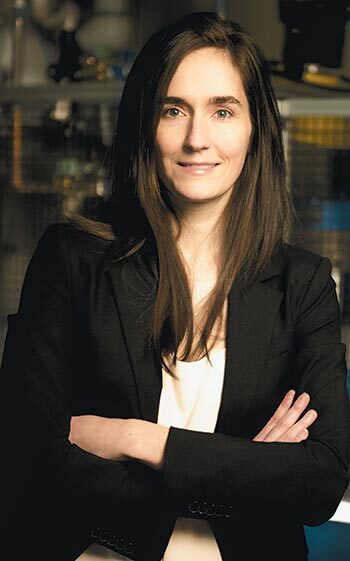
Martine Dubé, professor in the Department of Mechanical Engineering and Chairholder of the Marcelle-Gauvreau Research Chair in Environmentally Friendly Composite Materials
The Chair’s work will also focus on finding recycling solutions for aircraft frames and wind turbine blades, which are largely made of thermosetting materials. The specific constraints of the different materials to be recycled will require unique solutions. For example, aeronautical structures composed of carbon fibre will be subject to pyrolysis or solvolysis to separate the fibre from the resin. The fibre will then be processed, resized and shaped before being infused with new resin to form new parts.
Recycling fibreglass contained in wind turbine blades presents an additional challenge: the cost of virgin fibreglass is extremely low. The chosen recycling solution must be economically sustainable. Therefore, expensive separation processes like pyrolysis or solvolysis cannot be considered. These composites will be cut and ground and then extruded into a filament of compatible thermoplastics. The reinforced filament can then be shaped by 3D printing, a technology producing no material waste.
Much remains to be done before we can eliminate aircraft graveyards like the one in the Arizona desert or those of wind turbine blades, a source of energy that is supposed to be green. Martine Dubé and her team are convinced that the solution lies in finding efficient and economically sustainable processes.


